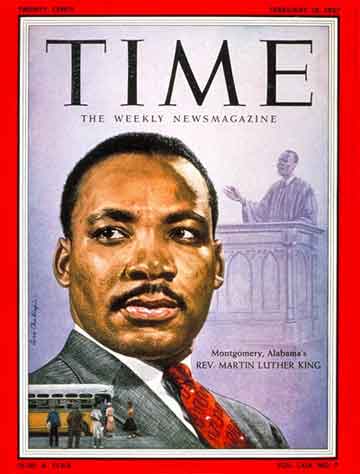
Montgomery Alabama's Rev. Martin Luther King
(3 of 10)
As a kid, in the classic tradition of kids, Martin wanted to be a fireman. Then, hoping to treat man's physical ills, he planned to become a doctor. Becoming more deeply engrossed in the problems of his race, he turned his hopes to the law because "I could see the part I could play in breaking down the legal barriers to Negroes." At Morehouse, he came to final resolution. "I had been brought up in the church and knew about religion," says King, "but I wondered whether it could serve as a vehicle to modern thinking. I wondered whether religion, with its emotionalism in Negro churches, could be intellectually respectable as well as emotionally satisfying." He decided it could—and that he would become a minister.
Techniques of Execution. King's Morehouse record (major in sociology) won him scholarship offers from three seminaries. But Martin Luther King Sr., a man of considerable parts, held that scholarships should go only to boys who could otherwise not afford to continue their education. King Sr. therefore reached into his own pocket to send his son to Pennsylvania's Crozer Theological Seminary.
For the first time in his life Martin King found himself in an integrated school; he was one of six Negroes among nearly 100 students at Crozer. Fearful that he might fail to meet white standards, King worked ceaselessly. Aside from his general theological studies, he pored over the words and works of the great social philosophers: Plato, Aristotle, Rousseau, Locke, Hegel (whose progress-through-pain theories are still prominent in King's thinking). Above all, he read and reread everything he could find about India's Gandhi. "Even now," says King, "in reading Gandhi's words again, I am given inspiration. The spirit of passive resistance came to me from the Bible and the teachings of Jesus. The techniques of execution came from Gandhi."
By Guess & by God. King's Crozer career was extraordinary. He graduated first in his class, was named the seminary's outstanding student, was president of the student body (the first Negro so honored), and earned a chance to go on to Boston University for his Ph.D. His doctoral thesis: A Comparison of the Conceptions of God in the Thinking of Paul Tillich and Henry Nelson Wieman.*
His Boston interests were not exclusively devoted to Theologians Tillich and Wieman. He had met Coretta Scott, a pretty and talented soprano who was studying at the New England Conservatory of Music. Their early dates were less than completely successful. "The fact that he was a minister made me shy away," recalls Coretta. "I had an awful stereotype in my mind." The suitor broke the stereotype: in June 1953, Coretta and King were married on the front lawn of her home in Marion, Ala. Just 15 months later they arrived in Montgomery to take up full-time pastoral duties at the Dexter Avenue Baptist Church, and to assume the role for which, as if by guess and by God, he had been preparing all his life.
